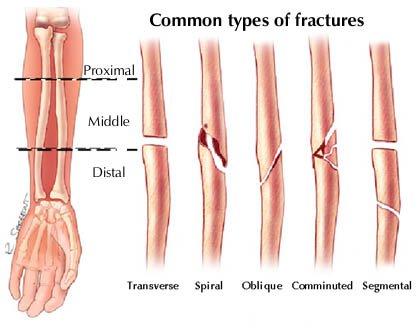Fractures
If you have a fracture and you are trying to obtain Social Security disability benefits, you must have the opinion of your treating doctor. The Social Security Administration wants to know how long it will take for your fracture to heal. This information must come from your doctor. Your doctor needs to state in writing if future surgery and rehabilitation will be needed. Generally, your fracture must keep you from working for at least 12 continuous months to satisfy the Social Security rules. A simple, well healed fracture may cause no limitations at all.
Poorly healed fractures or those involving a joint can be more complicated since these are likely to produce functional limitations over a long period of time. Poorly healed fractures may cause severe, debilitating pain. The medical opinions related to poorly healed fractures or fractures involving a joint are likely to change over time as to the medical diagnosis and prognosis. Physical therapy may be a big issue in these cases.
 The Social Security Administration has a long history of attempting to apply a closed period of disability to fracture cases. The reasoning they apply goes something like this: “well we see that you broke your leg and we know you could not work until it was healed, but now that it is healed everything is great and you can go back to work, so we will give you disability payments for one year and then it will end.” Therefore, it is essential that your doctor state in writing his or her opinion about an unhealed fracture and the associated problems.
The Social Security Administration has a long history of attempting to apply a closed period of disability to fracture cases. The reasoning they apply goes something like this: “well we see that you broke your leg and we know you could not work until it was healed, but now that it is healed everything is great and you can go back to work, so we will give you disability payments for one year and then it will end.” Therefore, it is essential that your doctor state in writing his or her opinion about an unhealed fracture and the associated problems.
Issues for Fracture Cases:
- Which bone or bones were fractured – was a joint involved
- Has solid union occurred, if so when did it occur
- If solid union has not occurred, what is the projected date of union by the doctor
- Is more surgery needed, if so, what type
- Is rehabilitation required, if so, how long will it take – physical therapy
- When does the person regain functional use of the arm, leg, hip, or other injured part of the body
- Is a cast or other protective device being used
- Are assistive devices being used – simple cane, 4-point cane, single crutch, pair of crutches, or walker. How long was the device used if not used currently
- Ability to walk, if so, how far, with or without pain
What Our Clients Say:
Member:

Attorney Gregory Kornegay
Greg is a trial attorney in Wilmington with over 30 years of experience. Greg was born and raised in southeastern North Carolina. Before law school he managed a store with employees making a payroll every week. His first job out of law school was as an Assistant District Attorney investigating and trying cases for the State of North Carolina. Through the years he has handled many different types of cases – including death penalty cases.
Being married with children has been a blessing and a challenge, but has served him well in understanding the problems individuals and families face as they live out their lives. Greg believes that each case is different and the needs of each client are unique, but there are certain themes of life that we all share.


